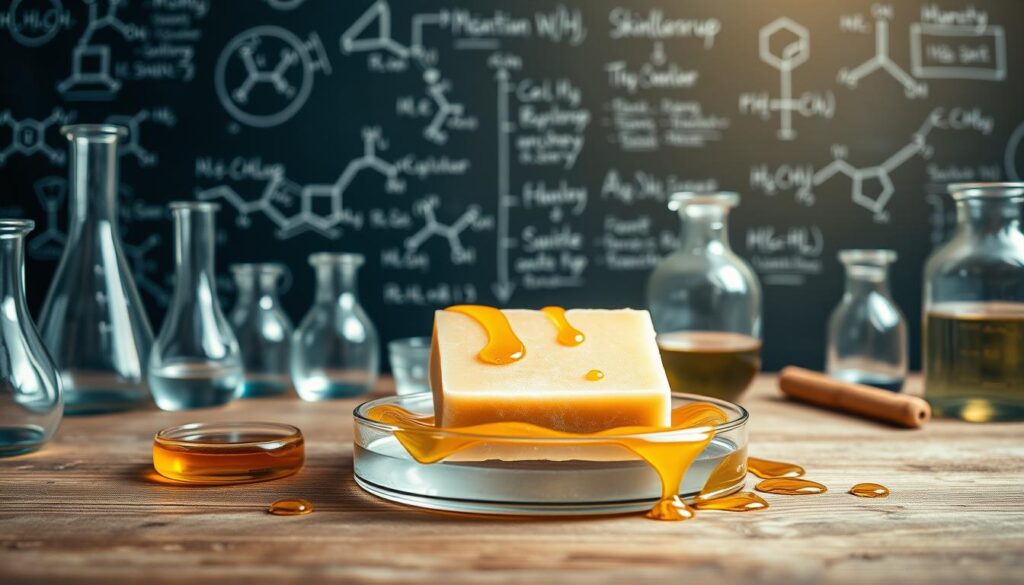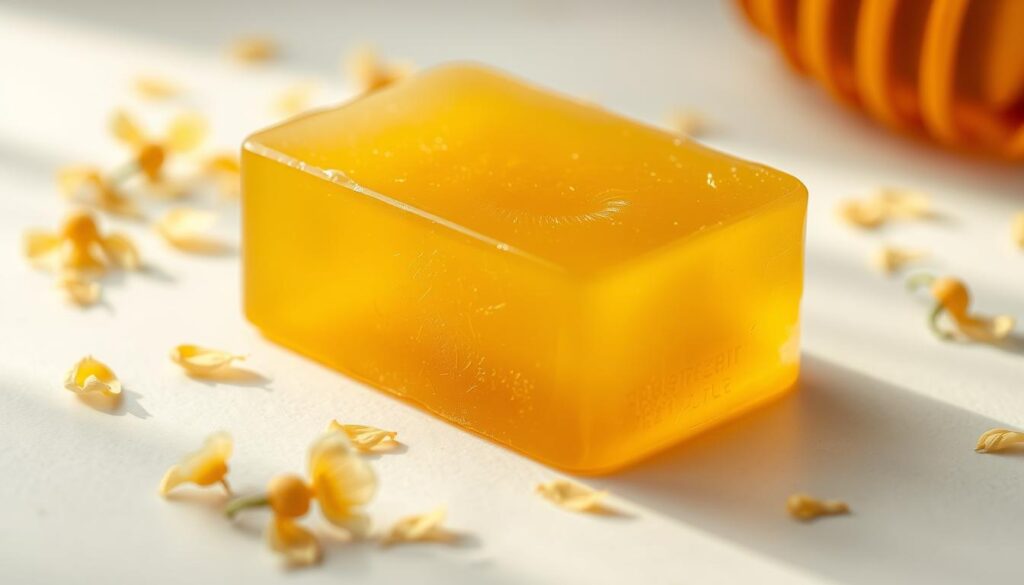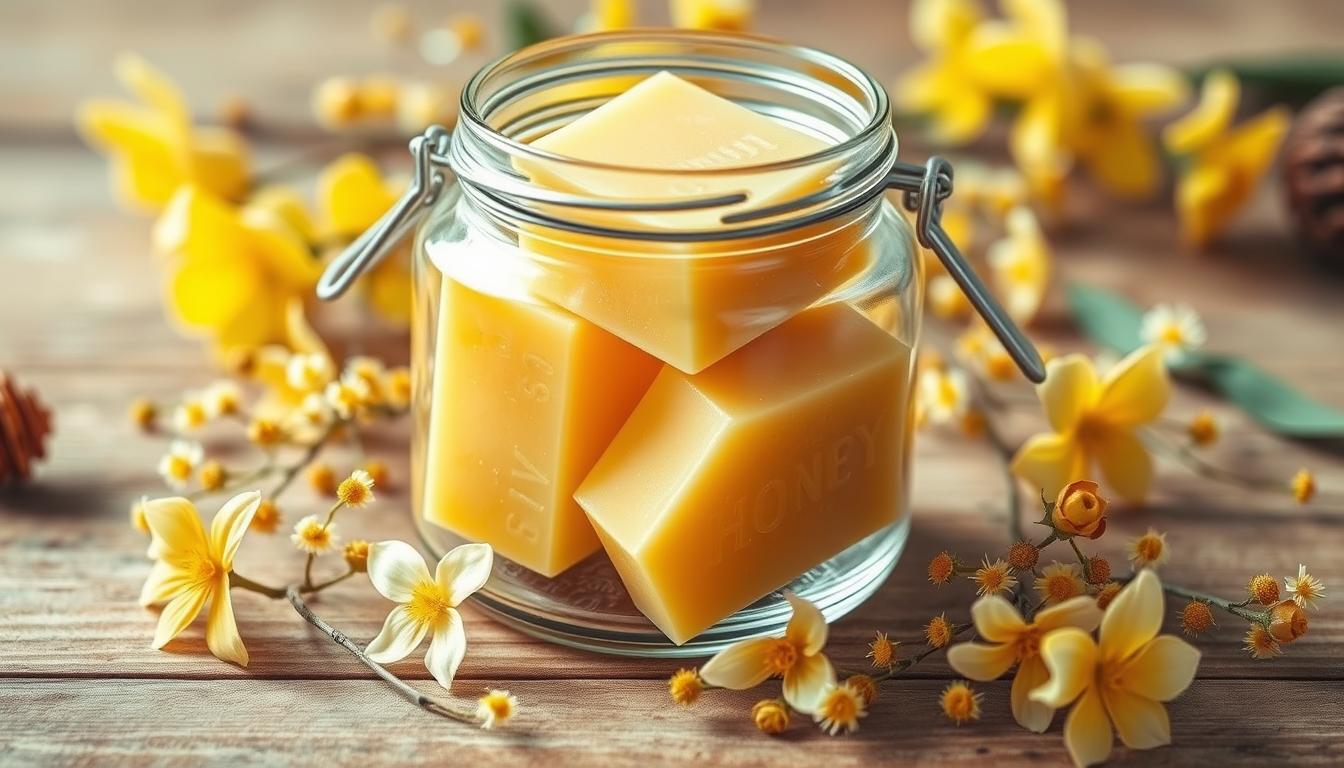There’s something undeniably special about honey. Used for centuries in rituals, remedies, and recipes, this golden nectar now finds its way into handmade bars that pamper the skin. At Moonlight Cottage Skincare, we craft each bar with care, blending local Hampshire honey and beeswax for a truly indulgent experience.
Unlike mass-produced cleansers, honey-based bars offer a dual action—gently cleansing while locking in moisture. Shiva Organic Raw Honey, a premium choice, enhances this effect with its rich enzymes and antioxidants. Whether your skin craves hydration or soothing relief, these bars adapt effortlessly.
Perfect for the UK’s unpredictable weather, honey soap is a year-round ally. Its humectant properties help combat dryness in winter, while its lightness suits summer’s humidity. Dive deeper as we explore its history, science, and practical perks.
Key Takeaways
- Honey soap cleanses and nourishes simultaneously.
- Locally sourced ingredients ensure quality and sustainability.
- Ideal for all skin types, especially in changing climates.
- Rich in antioxidants for a healthier complexion.
- Offers long-lasting hydration without heaviness.
Why Honey in Soap is a Skincare Game-Changer
Long before modern skincare, honey was treasured for its healing touch. Cleopatra famously bathed in milk and honey, while Romans valued beeswax as currency. Today, this golden ingredient still transforms skincare products, blending ancient wisdom with contemporary science.
The Ancient Roots of Honey in Skincare
Egyptians used honey to preserve mummies and soothe burns. Its antibacterial properties made it ideal for wound care. By the Victorian era, soap-makers shifted from animal fats to plant oils, paving the way for gentler bars infused with honey.
In Hampshire, artisans honour this legacy. They pair local honey with coconut and olive oils, ensuring each bar meets modern safety standards. The result? A soap that nurtures cells while respecting tradition.
How Modern Soap-Making Harnesses Honey’s Power
Cold-process methods retain glycerine, a natural moisturiser often stripped from mass-produced bars. Handmade versions, like those from Moonlight Cottage, lock in hydration. For every pound of beeswax, eight pounds of honey are needed—a testament to nature’s precision.
| Feature | Handmade Honey Soap | Mass-Produced Soap |
|---|---|---|
| Glycerine | Retained | Removed |
| Ingredients | Local honey, plant oils | Synthetic additives |
| Skin Benefits | Deep hydration | Often drying |
Over 10 years, eczema sufferers have reported relief with honey soap. Its anti-inflammatory effects, once prized by Romans, now soothe modern skin woes. Truly, some remedies stand the test of time.
The Science Behind Honey in Soap: Natural Benefits for Soft, Glowing Skin
Behind every golden bar lies a blend of biochemistry and tradition. Over 200 bioactive compounds work synergistically to nourish cells, making these bars more than just cleansers—they’re skin allies.
Humectant Properties: Locking in Moisture
With 20% water content, honey acts like a magnet for hydration. It draws moisture from the air into the skin, combating dry skin—a boon for Britain’s chilly winters. Beeswax’s lipids add a waterproof layer, sealing the deal.

Antioxidants and Free Radical Defence
Phenolic acids in honey neutralise free radicals from pollution. Its ORAC value rivals green tea, shielding against urban grime. Glucose oxidase, an enzyme, produces hydrogen peroxide—a gentle antibacterial agent.
Anti-Inflammatory Effects for Irritated Skin
UK trials highlight honey’s ability to inhibit MMP-9, easing eczema flare-ups. Propolis, found in raw varieties, amps up antimicrobial benefits. For acne-prone types, this means fewer breakouts and calmer complexions.
- Key Fact: Cold-process methods preserve glycerine, enhancing hydration.
- Did You Know? Negative ions from beeswax may boost mood—a bonus during gloomy days.
Honey Soap for Different Skin Types
From parched winter cheeks to temperamental breakouts, honey soap offers tailored care. Its versatility stems from raw ingredients like Hampshire honey, which adapt to unique needs. Whether you’re battling flakes or redness, there’s a bar to match.
Dry Skin: Deep Hydration and Repair
For dry skin, shea butter-enriched bars work wonders. They lock in moisture during harsh winter months, thanks to honey’s humectant pull. Mango butter balances pH levels, preventing tightness after washing.
Pair with a 74g PET jar of beeswax hand cream for cracked knuckles. Avoid overheating the soap—cold-processed enzymes stay active longer, ensuring lasting relief.
Sensitive Skin: Gentle, Chemical-Free Care
SLS/SLES-free formulas soothe sensitive skin, even with eczema. Chamomile and lavender variants use allergen-free fragrances, reducing irritation risks. Propolis in raw honey calms redness without stripping natural oils.
Acne-Prone Skin: Antibacterial and Healing Benefits
Acne-prone types benefit from lauric acid in coconut oil. It targets bacteria while honey’s enzymes gently exfoliate. Use twice daily—overwashing can disrupt the skin barrier. For perioral dermatitis, try pairing with a beeswax lip balm.
- Pro tip: Store artisanal bars in a dry, cool place to preserve their integrity.
- Did you know? Cold-process methods retain 20% more glycerine than commercial soaps.
Beyond Moisturising: Additional Benefits of Honey Soap
Golden soap bars infused with honey do more than just cleanse—they transform. While their hydrating power is well-known, lesser-known perks like gentle exfoliation and pollution defence make them a skincare multitasker. Here’s how these bars elevate your routine.

Natural Exfoliation for a Radiant Glow
Crystallised honey in soap bars acts like a micro-scrub. It’s fine granules buff away dead cells without irritation, unlike harsh synthetics. Ferulic acid, found in raw varieties, brightens dullness by inhibiting pigmentation enzymes. Perfect for a pre-morning-routine polish.
Anti-Ageing and Skin Brightening
Gluconic acid in honey gently fades age spots over time. Flavonoids, its UV-shielding compounds, combat photoaging—ideal for day use. Paired with antioxidant-rich diets, these bars help maintain a youthful bounce. Beeswax forms a ‘second skin’, locking in moisture and smoothing fine lines.
Protection Against Environmental Damage
Urban dwellers, take note: honey’s negative ions neutralise pollutants. Its wax barrier shields from smog and free radicals. Morning use helps skin face the day resiliently. Allergy sufferers might find relief too—propolis in raw honey soothes reactive complexions.
- Pro tip: Store bars away from steam to preserve exfoliating crystals.
- Science bit: Beeswax’s lipids mimic skin’s natural barrier, enhancing protection.
How to Choose and Use Honey Soap for Best Results
Not all honey soaps are created equal—knowing what to look for ensures maximum benefits. Whether you’re combating winter dryness or seeking gentle acne care, selecting the right bar makes all the difference. Here’s how to identify quality products and incorporate them effectively.
Spotting Quality: Ingredients to Look For
Decode INCI lists like a pro. Authentic soap made honey lists “mel” (Latin for honey) rather than vague “parfum”. Cold-process bars retain glycerine—perform the snap test: quality bars break cleanly when bent.
Prioritise these components:
- Beeswax soap bases (minimum 5% content)
- Plant-derived oils like olive or coconut
- Absence of SLS/SLES chemicals
Daily Routine Integration
For winter mornings, pair with a nourishing hand cream. Evening users benefit from honey’s wound-healing properties during sleep. Those with acne should limit use to twice daily to maintain pH balance.
| Time | Method | Pair With |
|---|---|---|
| AM | Cool water rinse | Vitamin C serum |
| PM | Steam towel prep | Hyaluronic acid |
DIY Enhancements
Upcycle soap ends as drawer fresheners by grating them into muslin bags. For cracked heels, create a foot bath with:
- 1L warm water
- 50g grated beeswax soap
- 5 drops peppermint oil
Store bars in breathable containers to prevent honey fermentation. For extra day time protection, follow with a beeswax-based hand cream.
Conclusion
For centuries, people have trusted the gentle power of honey soap to care for their skin. Today, it remains a favourite for its multi-generational appeal and eco-friendly charm. Plastic-free packaging and locally sourced beeswax make these bars kind to both your complexion and the planet.
Artisanal products offer more than just cleansing—they’re a nod to sustainability. Supporting small beekeepers helps preserve British wildlife while delivering benefits that mass-produced items can’t match. Plus, each bar lasts longer than liquid alternatives, saving you money over time.
Ready to experience the difference? Try Hampshire-made honey soap with confidence—our money-back guarantee ensures satisfaction. Keep an eye out for seasonal twists, like autumn’s heather-infused bars. Your skincare routine deserves this golden upgrade.


 using WordPress and
using WordPress and
No responses yet